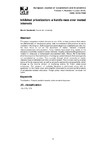Inhibited privatization: a hurdle race over vested interests

View/
Use this link to cite
http://hdl.handle.net/2183/23386Collections
Metadata
Show full item recordTitle
Inhibited privatization: a hurdle race over vested interestsAuthor(s)
Date
2015Citation
Senderski, M. (2015). Inhibited privatization: a hurdle race over vested interests. European Journal of Government and Economics, 4(1), 46-66. https://doi.org/10.17979/ejge.2015.4.1.4306
Abstract
[Abstract] This paper recognizes vested interests as one of the primary premises that reduce the effectiveness of privatization policy, stall its momentum and produce structural problems in the long-run. Both exogenous and endogenous drawbacks are cited, but the main focus is put on the dynamism of vested interests’ character, interconnectedness and evolution. Policy makers have been long aware of the existence of activities rooted in vested interests including empire building behaviors, creation of sinecures or extravagant management style. Hence, the fundamental effort here is put on the identification of emerging vested interests that were typically not considered by scholars. The channels through which conventional vested interests have snowballed over time are emphasized. This includes casting a closer glance at family employment, as well as at sports sponsorship arrangements, which emerge as the favorite domain of marketing activity for Polish state-owned enterprises. The research of available literature is performed, along with its application to the Polish case, and insightful observations concerning the anatomy of privatization-related reluctance. Rough policy recommendations conclude the paper
Keywords
Privatization
Poland
Vested interests
State-owned enterprises
Poland
Vested interests
State-owned enterprises
Editor version
Rights
Atribución 4.0 España
ISSN
2254-7088






